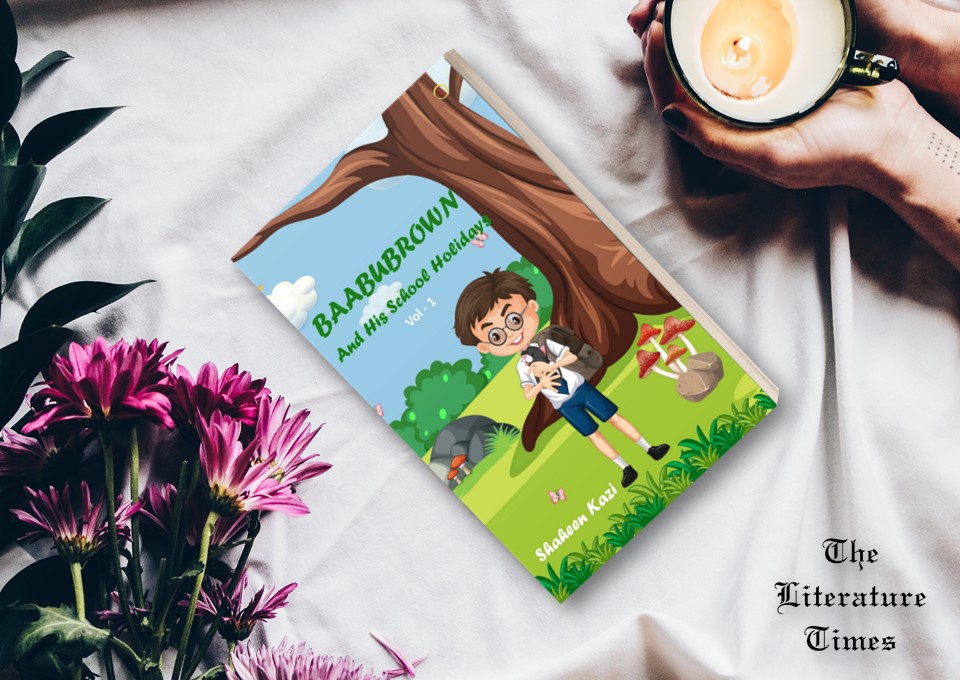Holidays are the best time of the year for every child, especially school holidays. Every child counts the period left for their school holidays to commence, irrespective of whether s/he is interested in, and good at maths or not. Children love to discuss about the holidays long before they commence and after the holidays are over, they continue to discuss how they spent their holidays even long after they resume schools. Such is the excitement that even elders feel enthusiastic to plan and make holidays as interesting as possible. The book “Baabubrown And His School Holidays” gives a refreshing little journey into the way holidays are spent by a child who is kindhearted, loves activities, has true friends who help him in times of difficulties and is naughty when it comes to demanding gifts from his parents.
Children’s books are always tough to attempt because one has to think like a child. The author Shaheen Kazi does it well, taking the reader through various emotions that a child goes through. She touches upon main concerns of children, such as jealousy and dislike towards siblings, a desire to not share rooms and toys with brothers and sisters and a competition with the siblings in gaining love from parents, all of which are feelings that most kids have gone through, though they may develop love towards their siblings after they grow up. However, kids who have no siblings go through a different set of feelings of loneliness and miss company somewhere deep down inside. Kazi effectively raises importance of siblings/elder cousins by adding few such events in the story, that make the main character to find ways of having company, under some or the other.
A book for children should be equally enjoyable for the adult who reads it out aloud to the child and Shaheen Kazi takes good care of that aspect as well. She makes the book enjoyable by inserting reactions from grandmother of Baabubrown, by writing about the usual disagreements of the child with his grandmother and the eventual obedience which the child practices almost always. Kazi also takes care of the interest of the adult reader by summarizing each event with a flair of art, by inserting poems at the end of every chapter.
Yet another important concern addressed in the story is about the activities of children. Most of the times, present day kids spend their hours playing with electronic gadgets, games in mobile phones, etc. The book subtly shows various outdoor activities taken by Baabubrown along with his friends, which make them not only happy but also skilled in work. The story also highlights the involvement of elders in helping kids to look forward to outdoor activities during vacations, to bring children in contact with mother nature and feel happy. The author adds a little humor in the dialogues during some such events and makes her readers smile during others.
The book is well covered with descriptive, colorful illustrations at regular intervals, helping the child grasp the story properly. The illustrations are perfectly designed to depict what the author wants to convey and are inserted at places to accentuate the story further. Language of the book is simple and easy to read, easy to explain and easy to understand, so that a school-going teenager can also read it aloud to his/her younger siblings. Humour is inserted well at places to keep the readers in a lighter mood and hence, even adults will find the book refreshing.
The book does not only have good side of the main character, but also shows him stealthily doing wrong things in order to get his demands fulfilled. But, he also has love and respect towards his parents, who then teach him right manners and ethical behavior. Thus, the author subtly hints at what parents may do if a child makes unreasonable demands and finds wrong ways to fulfill them. “Baabubrown And His School Holidays” has all the flavours of an interesting read and is recommended for every household, to read it out aloud to children, to make them learn and realize things and above all, to strengthen the parent-child relationship.
Reviewed By: Vividha Bindu, The Literature Times


